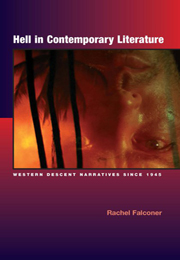Book contents
- Frontmatter
- Contents
- Acknowledgements
- Introduction: Descent and Return – the katabatic imagination
- 1 Hell in Our Time
- 2 Chronotopes of Hell
- 3 Auschwitz as Hell
- 4 Surviving with Ghosts: Second-generation Holocaust Narratives
- 5 Katabatic Memoirs of Mental Illness
- 6 Engendering Dissent in the Underworld
- 7 Postmodern Hell and the Search for Roots
- 8 East-West Descent Narratives
- Epilogue: Katabasis in the Twenty-First Century
- Appendix: Primo Levi, ‘Map of reading’
- Bibliography
- Index
Introduction: Descent and Return – the katabatic imagination
Published online by Cambridge University Press: 12 September 2012
- Frontmatter
- Contents
- Acknowledgements
- Introduction: Descent and Return – the katabatic imagination
- 1 Hell in Our Time
- 2 Chronotopes of Hell
- 3 Auschwitz as Hell
- 4 Surviving with Ghosts: Second-generation Holocaust Narratives
- 5 Katabatic Memoirs of Mental Illness
- 6 Engendering Dissent in the Underworld
- 7 Postmodern Hell and the Search for Roots
- 8 East-West Descent Narratives
- Epilogue: Katabasis in the Twenty-First Century
- Appendix: Primo Levi, ‘Map of reading’
- Bibliography
- Index
Summary
Speaking on television on the anniversary of September 11th, Mayor Rudolph Giuliani described New York City, the night after the attack on the World Trade Center, as ‘Hell, what Dante must have meant when he described Hell’. In such a context, this familiar allusion is striking in spite of, or perhaps because of, its very conventionality. A Catholic invokes ‘Hell’ and ‘Dante’ in the same breath, incidentally omitting reference to any sacred text. Like many present-day Catholics including the current Pope, Giuliani doesn't claim to believe in a theological Hell, an actual place of eternal torment to which sinners are sent in the afterlife. But the invocation of the name of ‘Hell’, together with the appropriation of Dante, constitute something more than a literary allusion. The double invocation aims to seal off the event from others, to claim for it a unique status, to transform it from a historical occurrence into a mythic absolute. In this book I argue that, like Giuliani, many secular Westerners retain a vestigial or quasi-religious belief in Hell: Hell as the absolutely horrific experience from which no one emerges unchanged. In the Western imaginative tradition, even more important than the notion of Hell as a sacred space is our belief in the journey through Hell, the idea of the transformative passage, the destruction and rebirth of the self through an encounter with the absolute Other. The arc of such a journey only becomes visible retrospectively, when remembered and narrated.
- Type
- Chapter
- Information
- Hell in Contemporary LiteratureWestern Descent Narratives since 1945, pp. 1 - 12Publisher: Edinburgh University PressPrint publication year: 2004



